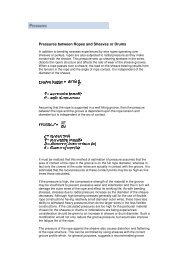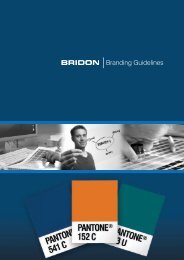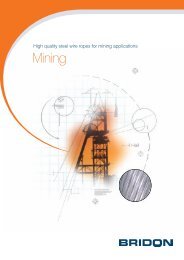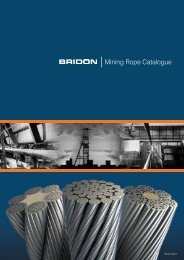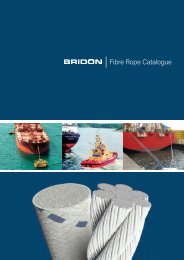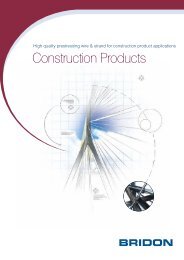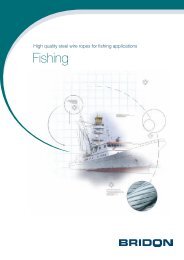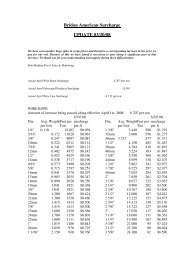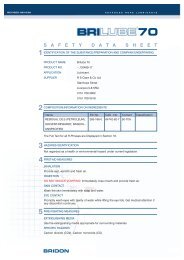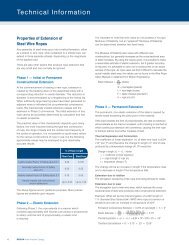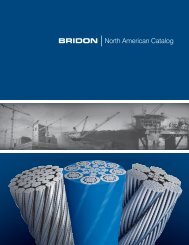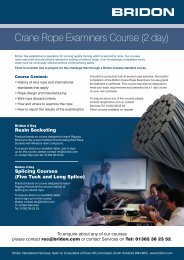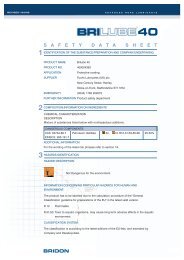Download the full Mining Brochure (Imperial) - Bridon
Download the full Mining Brochure (Imperial) - Bridon
Download the full Mining Brochure (Imperial) - Bridon
- No tags were found...
You also want an ePaper? Increase the reach of your titles
YUMPU automatically turns print PDFs into web optimized ePapers that Google loves.
Technical Information8. Pressures between Ropes and Sheaves or DrumsIn addition to bending stresses experienced by wire ropesoperating over sheaves or pulleys, ropes are also subjectedto radial pressure as <strong>the</strong>y make contact with <strong>the</strong> sheave.This pressure sets up shearing stresses in <strong>the</strong> wires,distorts <strong>the</strong> rope’s structure and affects <strong>the</strong> rate of wear of<strong>the</strong> sheave grooves. When a rope passes over a sheave,<strong>the</strong> load on <strong>the</strong> sheave results from <strong>the</strong> tension in <strong>the</strong> ropeand <strong>the</strong> angle of rope contact. It is independent of <strong>the</strong>diameter of <strong>the</strong> sheave.Load on bearing =Assuming that <strong>the</strong> rope is supported in a well fitting groove,<strong>the</strong>n <strong>the</strong> pressure between <strong>the</strong> rope and <strong>the</strong> groove isdependent upon <strong>the</strong> rope tension and diameter but isindependent of <strong>the</strong> arc of contact.Pressure, P =2TDdP = pressure (kg/cm 2 )T = rope tension (kg)D = diameter of sheave or drum (cm)d = diameter of rope (cm)Maximum Permissible PressuresNumber ofouter wiresin strands2T sin θ25 - 8 Ordinary lay5 - 8 Lang’s lay9 - 13 Ordinary lay9 - 13 Lang’s lay14 - 18 Ordinary lay14 - 18 Lang’s layTriangular strandCastironkgf/cm 220253540424755Groove materialLow 11 to 13%carbon Mn steelcast steel orequivalentalloysteelskgf/cm 2 kgf/cm 2404560707585100105120175200210240280It should be emphasised that this method of estimation ofpressure assumes that <strong>the</strong> area of contact of <strong>the</strong> rope in<strong>the</strong> groove is on <strong>the</strong> <strong>full</strong> rope diameter, whereas in fact only<strong>the</strong> crowns of <strong>the</strong> outer wires are actually in contact with <strong>the</strong>groove. The local pressures at <strong>the</strong>se contact points may beas high as 5 times those calculated and <strong>the</strong>refore <strong>the</strong>values given above cannot be related to <strong>the</strong> compressivestrength of <strong>the</strong> groove material.If <strong>the</strong> pressure is high, <strong>the</strong> compressive strength of <strong>the</strong>material in <strong>the</strong> groove may be insufficient to preventexcessive wear and indentation and this in turn will damage<strong>the</strong> outer wires of <strong>the</strong> rope and effect its working life. Aswith bending stresses, stresses due to radial pressureincrease as <strong>the</strong> diameter of <strong>the</strong> sheave decreases.Although high bending stresses generally call for <strong>the</strong> use offlexible rope constructions having relatively small diameterouter wires, <strong>the</strong>se have less ability to withstand heavypressures than do <strong>the</strong> larger wires in <strong>the</strong> less flexibleconstructions. If <strong>the</strong> calculated pressures are too high for<strong>the</strong> particular material chosen for <strong>the</strong> sheaves or drums orindentations are being experienced, consideration shouldbe given to an increase in sheave or drum diameter. Sucha modification would not only reduce <strong>the</strong> groove pressure,but would also improve <strong>the</strong> fatigue life of <strong>the</strong> rope.The pressure of <strong>the</strong> rope against <strong>the</strong> sheave also causedistortion and flattening of <strong>the</strong> rope structure. This can becontrolled by using sheaves with <strong>the</strong> correct groove profilewhich, for general purposes, suggests an optimum grooveradius of nominal rope radius +10%. The profile at <strong>the</strong>bottom of <strong>the</strong> groove should be circular over an angle ofapproximately 120 o , and <strong>the</strong> angle of flare between <strong>the</strong>sides of <strong>the</strong> sheave should be approximately 52 o .Hardness of Rope WireRopegradeMin. TensileStrength2160N / mm 21960N / mm 21770N / mm 21570N / mm 2ApproximateEquivalentAPI 9AGradeEEIPSEIPSIPSPSApproximateHardnessBrinel480 / 500470 / 480445 / 470405 / 425Rockwell‘C’Suggested pulley hardness: 250-300 Brinell for Mn steel orequivalent alloy steel.If <strong>the</strong> calculated pressure is too high for <strong>the</strong> particularmaterial chosen for <strong>the</strong> pulley or drum, considerationshould be given to increase in pulley or drum diameter.Such a modification would not only reduce <strong>the</strong> groovepressure, but would also improve <strong>the</strong> fatigue life of <strong>the</strong> ropeby reducing <strong>the</strong> bending stresses imposed.5251494530 BRIDON <strong>Mining</strong>



